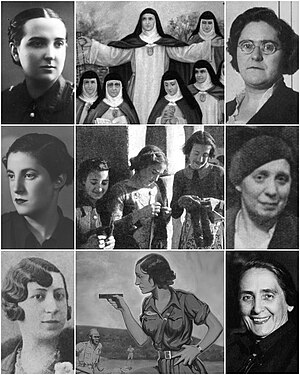
Back حق النساء في التصويت خلال فترة الحرب الأهلية الإسبانية Arabic El sufragio femenino durante la Segunda República española Spanish
| Part of a series on |
| Women in the Spanish Civil War |
|---|
 |
|
|
Women's suffrage in the Spanish Second Republic period was the result of efforts dating back to the mid-1800s. Women and men working towards universal suffrage had to combat earlier feminist goals that prioritized social goals, including access to education, political rights such as a woman's right to vote and equal wages. As a middle class developed and women gained more access to education, they began to focus more on the issue of suffrage but this was often around specific ideological philosophies; it was not tied into a broader working class movement calling for women's emancipation.
Between 1877 and 1930, several attempts were made to give women the right to vote. The Dictatorship of Primo de Rivera would see a two-year period where women held the right to vote, from 1924 to 1926. Because of a move from an elected congress to an appointed government, no elections were held in this period and women never went to the polls. Unsuccessful attempts to give women suffrage also took place in 1877, 1907, 1908 and 1918. Despite this, Primo de Rivera's royal decree and the arguments put forward in that period would prove influential during the debate in the period to come.
The Second Republic would see women granted full emancipation, including the right to vote, on 1 October 1931 with women going to the polls only twice: on 2 November 1933 and again in 1936. The right to vote came after the passing of a constitution after elections in June 1931. Both sides of the suffrage movement had women representing their causes in one of the greatest duels between Spanish parliamentarians. Clara Campoamor Rodríguez represented those seeking full emancipation for women, while the left-leaning Victoria Kent Siano represented conservative and Republican views seeking to prevent women's right to vote. Campoamor claimed that women's access to the ballot box was an ethical obligation for the Congress and that Spanish women had won it having battled on behalf of the Republic for a long time. Kent argued women were not yet ready to vote as they were not sufficiently educated to make an informed decision, submitting to the wishes of their husbands and the Church, a position supported by the conservatives although they had different reasons for resisting women's suffrage.
Following Francisco Franco's victory in the Spanish Civil War, neither women nor men would be able to vote in national elections until 1977, two years after his death.
© MMXXIII Rich X Search. We shall prevail. All rights reserved. Rich X Search